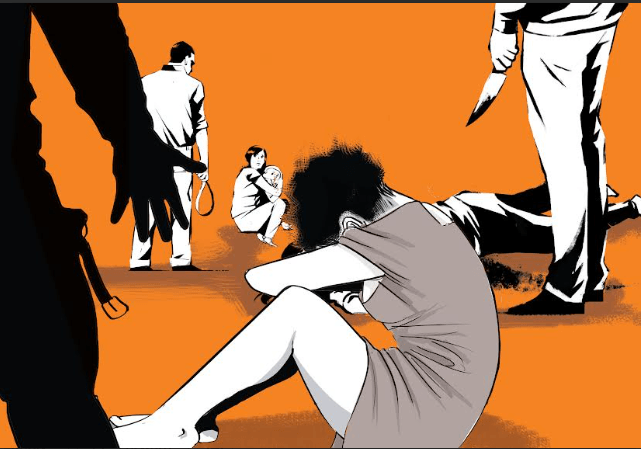Susan Mang’eni, 38, is taking a stab at the political arena for the second time.
Mang’eni, a trader in Busia county, has ideas on how to improve businesses if elected woman representative, but she is nervous about her chances.
She knows it’s tough for women but keeps pushing on in a bid to win over the electorate.
"In 2017, I went to the polling station on the day of the elections and realised there was no one to hold my hands," she says.
Mang’eni says lack of institutional support in her party, the Amani National Congress, led to her losing the seat.
“My party did not send agents and security personnel to the polling centres,” she says.
“I was the only county candidate and I had a heavy burden in consolidating votes.”
These are some of the problems women aspirants go through whenever Kenya's elections come around.
They are called 'flower girls' or 'someone’s wife' and their posters are torn down.
There was no communication about who would help me on the ground. When I went there, I was so disappointed. The party's support and steps were insufficient.
Mang’eni, who is now the UDA coordinator in Busia county, says when she went to the voters during the last election, she had no idea who the county coordinators were.
“There was no communication about who would help me on the ground. When I went there, I was so disappointed. The party's support and steps were insufficient,” she says.
She emphasises the importance of parties supporting aspirants before the elections and especially during the primaries.
“Any serious party must field presidential candidates, and they must ensure they have everything in place and a support system,” she says.
“This will ensure aspirants at the lower level are also considered. The fact that we lacked a presidential candidate made it worse as it led to a lack of support in guarding our votes.”
SECURITY MATTERS
Mang'eni, 38, says party policies on security should be clear and support must be robust when it comes to women.
“Security is defined as masculinity. If you don’t have any men to protect you, it’s easy for someone to assault you. Men who aspire to be leaders can secure themselves and their votes. You can’t steal his votes but for women, it is much easier,” she says.
Despite her concerns, ANC secretary general Simon Kamau says the party has a manual that protects women from harassment.
“We have the Women's League that nurtures, trains and mentors women aspirants. It covers how to respond to different scenarios as women or even how to react to sexual advances,” he says.
Kamau says ANC has a comprehensive programme and policies to make sure aspirants are safe during elections.
“As much as we encourage personal security, we also engage the National Police Service. There might be gaps here and there, but we do our best,” he says.
Ruth Dolo, an aspirant in Mugumoini ward, Lang'ata, agreed party policies are crucial in supporting women to victory.
“Being in a well-known party plays a big role. These small parties can let you down. If you are in a weak party in a region, you are bound to fail terribly,” she says.
Speaking in her house, Dolo, 52, said when that happens, an aspirant will just be making noise to people who have already made up their minds.
She remembers her failure vividly during the last election, saying it will not happen again.
“During my campaigns, I did not have a strong communication team that could coordinate well to take me to my desired destination. I had no idea that I needed this," she says.
NOT SO FLOWERY
Mang’eni who now is vying under a different party, UDA, said apart from party policies that don’t support women, the Women Representative seat is seen as a position for slay queens.
The name was changed to county MP for this very reason.
“In 2017, the woman rep's position, which came into force in 2013, was still a new concept. I spent a lot of time trying to understand it. Some male voters felt the post was for slay queens and prostitutes,” she says.
“They basically said women went for the post because of their looks. They couldn't see beyond their faces. This was demeaning talk and it made us lose value.
“You speak to men but they concentrate on how beautiful you are and how you have a beautiful body.”
Dolo says her looks were not a topic for discussion during the last elections.
“For me, it was not a hurdle. I think the voters knew what I stood for and they were able to overlook what I look like and concentrate on what I was bringing to the table,” she says.
Dolo, who is in Ford Kenya, says she has already assembled a team for her campaigns and is ready to win the Mugumoini MCA seat in Langata.
“I am ready. My only fear is the fear of humiliation and rejection,” she says.
HUGE FEES
Besides party policies and looks, female aspirants also have to grapple with high nomination fees.
In UDA and ODM, male gubernatorial aspirants pay fees of Sh500,000, while their female counterparts pay Sh250,000 to run.
Male senatorial aspirants part with 250,000, while female ones pay Sh125,000. Women Representative aspirants pay Sh250,000.
Kiambu governor aspirant Juliet Kimemia says her biggest failure during the last election was a lack of money.
Kimemia says she joined politics in 2016 and ran for the senatorial post, which she lost.
"I contested on a Kanu ticket but the power of the incumbency was way more powerful than I thought," she says.
"My competitors had lots of money. They had more than Sh70 million. As a new entrant, I could not match it.”
According to the Independent Electoral and Boundaries Commission, Kiambu county has a spending limit of Sh71 million for campaigns. In most cases, politicians use more than that amount.
With only about Sh15 million, Kimemia says she manoeuvered her way through but in the end, she lost the seat.
"If someone wants a nomination, she must spend so much money, which men don't fear," she said.
"Women take calculated risks. Men are desperate for these seats, while women are a bit spiritual and think it through before taking that huge step."
Kimemia will be facing men and women at the ballot.
She says the Coalition Law recently by President Uhuru Kenyatta may greatly reduce her chances.
The law provides that 70 per cent of the Political Parties Fund be distributed proportionately based on the total number of votes secured by each party in the preceding election.
"It's scary because it will limit my efforts. This is my biggest fear. The incumbent has a lot of money and is in Jubilee," Kimemia says.
She wants party policies to be revised to incorporate aspirants unable to get much money for nominations and campaigns.
IDEAS, NOT MONEY
But Keiyo South MP aspirant Jane Kotut disagrees, saying campaigns are not about how much you can afford.
“Yes, we need the money, but the agenda and ideas you are selling are more important. You can have money but without ideas, there is no use for the money,” she says.
Being a 'songbird' and the queen of music in her region has given her an advantage as a first-timer in the MP race.
Kotut says the stereotyping of women is rife. She says one stereotype is that women are just good at cooking and not leading. Another is that women are weak.
“Someone can say we should not be elected because I am a woman or someone uses language that is dehumanising and demoralising,” she says.
For me, it [my looks] was not a hurdle. I think the voters knew what I stood for and they were able to overlook what I look like and concentrate on what I was bringing to the table
She says her predecessor was body-shamed.
“At one point, there were rumours going around about her being a slay queen and not working,” she says.
"You need to grow a thick skin. When you are a strong candidate, they will not manage to pull you down."
Women aspirants, she said, also risk even being roughed up by goons.
ODM secretary general Edwin Sifuna says his outfit has party structures that favour women during elections.
“The party has a Women's League, and we have developed a manual to train women aspirants. People think you can just come from nowhere and become leaders, but there are many things you need to be trained on," he says.
“They are trained on how to dress and how to relate with people. ODM women aspirants have those skills."
Sifuna says the party also has a 'He for She' programme that seeks to get support for female aspirants from men.
“We also have discussions to support women's empowerment so they are able to financially support women in politics. We have a commitment with some of our international partners to support the women financially,” he says.
Despite this, in 202o, Sifuna had to apologise for using a rape slur on Malindi Member of Parliament Aisha Jumwa.
WAY OUT
Sifuna says men dominate the party primaries and elections for cultural reasons.
“Some parties work with assumptions even in social affairs. Some communities don't view women as equal to men or people with capacities equal to those of men," he says.
“Some cultures in the country still see the woman’s place as in the kitchen. With time, we are leaving these retrogressive cultures behind."
In 2017, 172 of the 1,883 elected seats were won by women, up from 145 in the 2013 General Election.
As a Busia woman rep aspirant, Mang'eni says all parties should come out with clear policies to establish an enabling environment for women.
“The party should know who their agents are and tell the aspirants. Each party must ensure they have a presence. They must organise the agents,” she said.
Mang'eni says the party should make itself attractive and its message clear so aspirants don’t give different messages to voters.
“It is their responsibility as a party to ensure there are no gaps. Where they find a gap, they seal it and make alternatives,” she says.
“Work out party policies and principles that cut across the board. Deliver a message that is for all. Make basic logistics. You are only good to the party when you win and not when you lose."
On the other hand, Koitut says women should also not rely on the party for everything.
“As an aspirant, you should not wait for everything from the party, like someone who has no hope or clue of what is expected of them,” she says.
National Gender and Equality Commission chair Joyce Mutinda cautioned political parties against submitting nomination lists that do not comply with the two-thirds gender rule.
“The commission will closely monitor all electoral processes. We shall document and share our findings. We will go to court if need be because we will not sit back and keep quiet when non-discrimination is not adhered to,” she said.
Edited by T Jalio
WATCH: The latest videos from the Star















